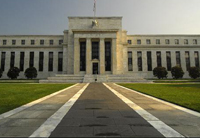US economy still expanding
Economic activity expanded further in June and early July, the Federal Reserve said on Wednesday, as slower housing markets were offset by gains in manufacturing and commercial real estate.

In the Fed's Beige Book summary of anecdotal economic conditions, seven Fed districts reported the pace of growth as "moderate" or "modest," while others said conditions were "moderating," "decelerating," "mixed" or "varied."
Only the Philadelphia district noted that economic conditions had improved.
The Fed said districts overall reported ongoing input cost pressures, particularly for petroleum-related items, but retail prices were increasing at a moderate rate.
Wage gains were described as either moderate or similar to the previous reporting period, but "significant upward pressure" was reported for wages and salaries for in-demand, highly skilled workers, Reuters reports.
“The Fed is not in a position to cut rates or hike rates,” said Chief Economist Brian Wesbury of First Trust Advisors LP in Lisle, Illinois. “Clearly, the economy accelerated in the second quarter, but I don't expect it to slow down that much as we move into the second half of this year.”
The Fed has left its main interest rate unchanged at 5.25 percent for a year. Futures markets show traders expect the Federal Open Market Committee to again vote to hold the rate steady at the conclusion of the Aug. 7 meeting.
Treasury notes were little changed after the report as concerns about credit-market risk held yields near the lowest in almost eight weeks. The yield on the benchmark 10-year note was 4.91 percent at 2:22 p.m. in New York.
The biggest risk to the six-year expansion is the housing slump, Bernanke told Congress last week. At the same time, inflation could worsen if energy and commodity prices start to feed through to other goods and services, he added.
The survey didn't dwell on the ripples that rising mortgage delinquencies are sending through Wall Street. Bear Stearns Cos. told investors in two failed hedge funds that they'll get little if any money back after “unprecedented declines'' in the value of securities used to bet on subprime mortgages. At least 35 companies' borrowing plans were disrupted in the past five weeks, Bloomberg reports.
Bernanke “will have to begin to start cutting rates before the end of the year,” said David M. Jones, president and chief executive of DMJ Advisors in Denver and a former economist at the New York Fed. “I don't see him doing that. They're going to continue to worry about inflation while Rome burns on the credit side.”
Source: agencies
Prepared by Alexander Timoshik
Pravda.ru
Subscribe to Pravda.Ru Telegram channel, Facebook, RSS!


